There is no way of knowing when a sick or injured chicken is going to need immediate, medical attention, so it is best to be prepared for the worst. During an urgent, medical situation, acquiring supplies should not be the priority. Knowing the types of emergency supplies to have on hand is as important as having a safe, quiet space in which they can recover.
I use my infirmary space for multiple purposes, including: a maternity ward for brooding hens, a time-out space for aggressive or problem chickens, a broody-breaker box and as a grow-out space for chickens being integrated into the flock. I'll show you some of my Sick Bay set ups shortly, but first, let's look at chicken first aid essentials.
Vetericyn Poultry Wound Spray
FIRST-AID KIT ESSENTIALS
- Vetericyn Plus Poultry Care Spray
- Vetrap
- vitamins & electrolytes
- an eye dropper or syringe
- Epsom salt-for soaking feet before bumblefoot treatment
- non-stick gauze pads
- disposable gloves
- aspirin (not baby aspirin)
- tweezers
- scissors
- Neosporin ointment
- Superglue gel (for broken beak repair
- an LED Headlamp
- styptic powder (for bleeding nails/beaks)
- dog nail clippers or a Dremel tool (for trimming beaks or toe nails)
- Chlorhexadine 2% solution (antibacterial, antifungal cleaning & sanitizing solution. Great for cleaning & sanitizing bumblefoot & other skin infections as well as cleaning/ sanitizing equipment, work areas & cages).
- The contact information for an avian veterinarian and your state's poultry pathology lab & extension service agents can be found HERE
Some other items you may wish to keep in a more extensive first aidl kit for your chickens are:
- liquid calcium (for vent prolapse)
- Popsicle sticks (for fashioning splints)
- a chicken saddle (for hens with feather loss from over-mating)
- Lafeber's Hand-feeding Formula-for sick chickens who are not eating independently.
- ProZyme– digestive & nutritional support for ill chickens not eating normally
- tea bags (for beak repair)
- Old towels (for calming a chicken during bumblefoot surgery, for instance, or bedding for very sick birds in the house)
- Dog Training Pads-floor padding for sick birds
*If you should find yourself without electrolytes in an emergency situation such as <heat stress or dehydration, Gatorade can be substituted or simply make your own electrolytes with items commonly found in the kitchen. Click here for the electrolyte recipe.
Learn about treating a broken beak here.
This baby chick was pecked by a broody hen, causing the wound shown. I sprayed Vetericyn on it 2-3 times per day and within 13 days the chick was completely healed with new feathers emerging through the site of the wound!
SICK BAY FOR CHICKENS
It is best to know how and where a sick-bay will be set up before it becomes necessary.
The basic requirements of a sick-bay are that it provide enough spacious for the chicken to move around in, is accessible for cleaning, and has a space for food and water apart from where it can relieve itself. It helps if it's in a dimly lit, quiet place that is a little warmer that the chicken was accustomed to outside. There are countless options for a sick-bay. I prefer wire-sided pet crates or a rabbit hutch setup.
When baby chicks requiring supplemental heat are injured, they should be physically separated inside the brooder from the other chicks. This is the setup I have used successfully with bullied and bullying chicks. Dividing the brooder with hardware cloth or window screening allows the chicks to share a heat source and remain visible to one another, which makes reuniting them later easier.
A rabbit hutch makes a fantastic hospital ward for chickens.
CARE OF A SICK CHICKEN
Information about caring for a sick chicken can be found HERE.
CARE OF INJURED BIRDS
Any time a bird is sick or injured, the bird must be housed separately from the flock until the injury is completely healed to avoid further injury, potential spread of a contagious illness, cannibalism and death. The recovery area should be a safe, quiet living space where they will remain until they are fully recovered. Much more about caring for injured birds HERE.
RETURNING INJURED BIRDS TO THE FLOCK
1) The injured bird should be 100% healed with no visible signs of blood or scabbing before being returned to the flock. (Covering it up with a purple dye product is not an acceptable substitute for time and complete healing.)
AND
2) Treat the injured bird like a stranger when reintroducing it to the flock. I recommend the Playpen Method for a conflict-free reunion. Again, patience is the key to success. Learn about the Playpen Method HERE.
Kathy Shea Mormino
Affectionately known internationally as The Chicken Chick®, Kathy Shea Mormino shares a fun-loving, informative style to raising backyard chickens. …Read on


shop my SPONSORS
There is no way of knowing when a sick or injured chicken is going to need immediate, medical attention, so it is best to be prepared for the worst. During an urgent, medical situation, acquiring supplies should not be the priority. Knowing the types of emergency supplies to have on hand is as important as having a safe, quiet space in which they can recover.
I use my infirmary space for multiple purposes, including: a maternity ward for brooding hens, a time-out space for aggressive or problem chickens, a broody-breaker box and as a grow-out space for chickens being integrated into the flock. I'll show you some of my Sick Bay set ups shortly, but first, let's look at chicken first aid essentials.
Vetericyn Poultry Wound Spray
FIRST-AID KIT ESSENTIALS
- Vetericyn Plus Poultry Care Spray
- Vetrap
- vitamins & electrolytes
- an eye dropper or syringe
- Epsom salt-for soaking feet before bumblefoot treatment
- non-stick gauze pads
- disposable gloves
- aspirin (not baby aspirin)
- tweezers
- scissors
- Neosporin ointment
- Superglue gel (for broken beak repair
- an LED Headlamp
- styptic powder (for bleeding nails/beaks)
- dog nail clippers or a Dremel tool (for trimming beaks or toe nails)
- Chlorhexadine 2% solution (antibacterial, antifungal cleaning & sanitizing solution. Great for cleaning & sanitizing bumblefoot & other skin infections as well as cleaning/ sanitizing equipment, work areas & cages).
- The contact information for an avian veterinarian and your state's poultry pathology lab & extension service agents can be found HERE
Some other items you may wish to keep in a more extensive first aidl kit for your chickens are:
- liquid calcium (for vent prolapse)
- Popsicle sticks (for fashioning splints)
- a chicken saddle (for hens with feather loss from over-mating)
- Lafeber's Hand-feeding Formula-for sick chickens who are not eating independently.
- ProZyme– digestive & nutritional support for ill chickens not eating normally
- tea bags (for beak repair)
- Old towels (for calming a chicken during bumblefoot surgery, for instance, or bedding for very sick birds in the house)
- Dog Training Pads-floor padding for sick birds
*If you should find yourself without electrolytes in an emergency situation such as <heat stress or dehydration, Gatorade can be substituted or simply make your own electrolytes with items commonly found in the kitchen. Click here for the electrolyte recipe.
Learn about treating a broken beak here.
This baby chick was pecked by a broody hen, causing the wound shown. I sprayed Vetericyn on it 2-3 times per day and within 13 days the chick was completely healed with new feathers emerging through the site of the wound!
SICK BAY FOR CHICKENS
It is best to know how and where a sick-bay will be set up before it becomes necessary.
The basic requirements of a sick-bay are that it provide enough spacious for the chicken to move around in, is accessible for cleaning, and has a space for food and water apart from where it can relieve itself. It helps if it's in a dimly lit, quiet place that is a little warmer that the chicken was accustomed to outside. There are countless options for a sick-bay. I prefer wire-sided pet crates or a rabbit hutch setup.
When baby chicks requiring supplemental heat are injured, they should be physically separated inside the brooder from the other chicks. This is the setup I have used successfully with bullied and bullying chicks. Dividing the brooder with hardware cloth or window screening allows the chicks to share a heat source and remain visible to one another, which makes reuniting them later easier.
A rabbit hutch makes a fantastic hospital ward for chickens.
CARE OF A SICK CHICKEN
Information about caring for a sick chicken can be found HERE.
CARE OF INJURED BIRDS
Any time a bird is sick or injured, the bird must be housed separately from the flock until the injury is completely healed to avoid further injury, potential spread of a contagious illness, cannibalism and death. The recovery area should be a safe, quiet living space where they will remain until they are fully recovered. Much more about caring for injured birds HERE.
RETURNING INJURED BIRDS TO THE FLOCK
1) The injured bird should be 100% healed with no visible signs of blood or scabbing before being returned to the flock. (Covering it up with a purple dye product is not an acceptable substitute for time and complete healing.)
AND
2) Treat the injured bird like a stranger when reintroducing it to the flock. I recommend the Playpen Method for a conflict-free reunion. Again, patience is the key to success. Learn about the Playpen Method HERE.



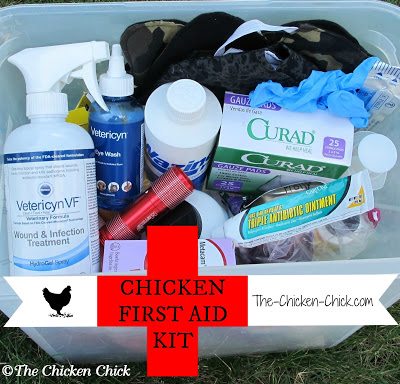
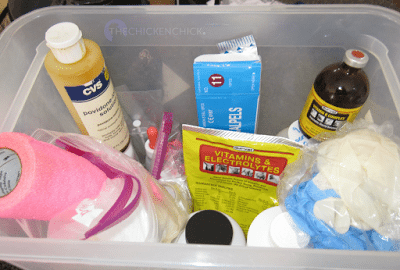






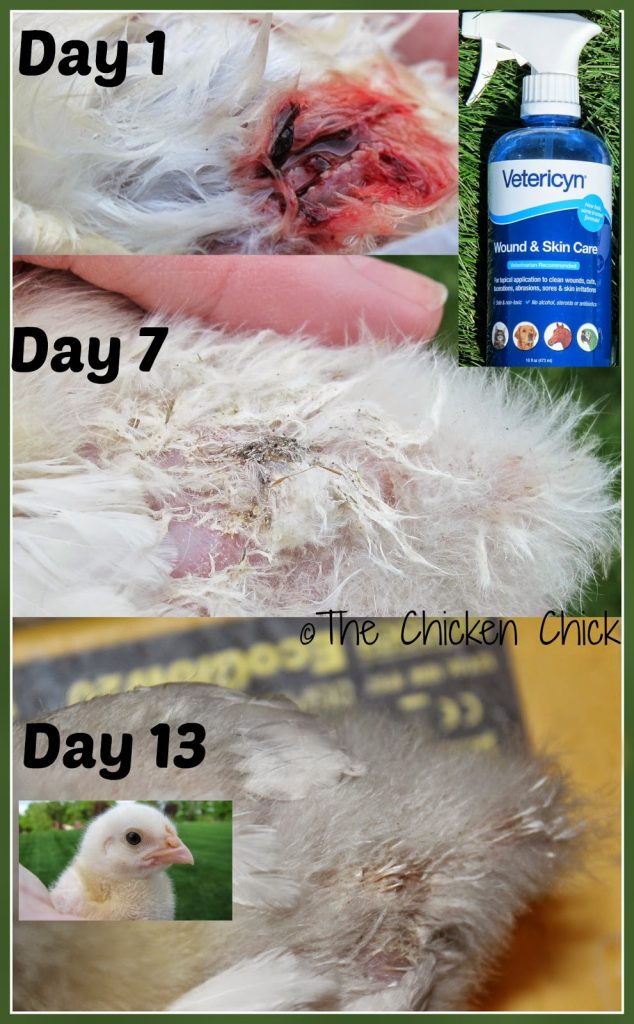
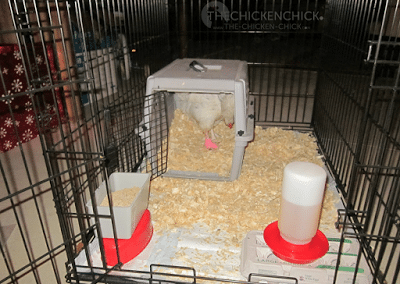
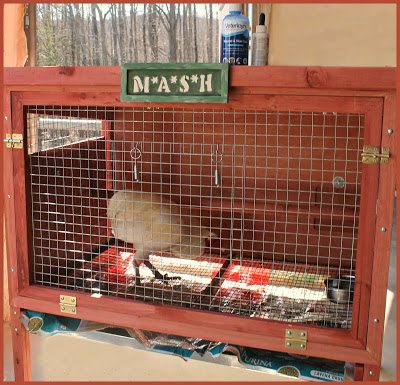
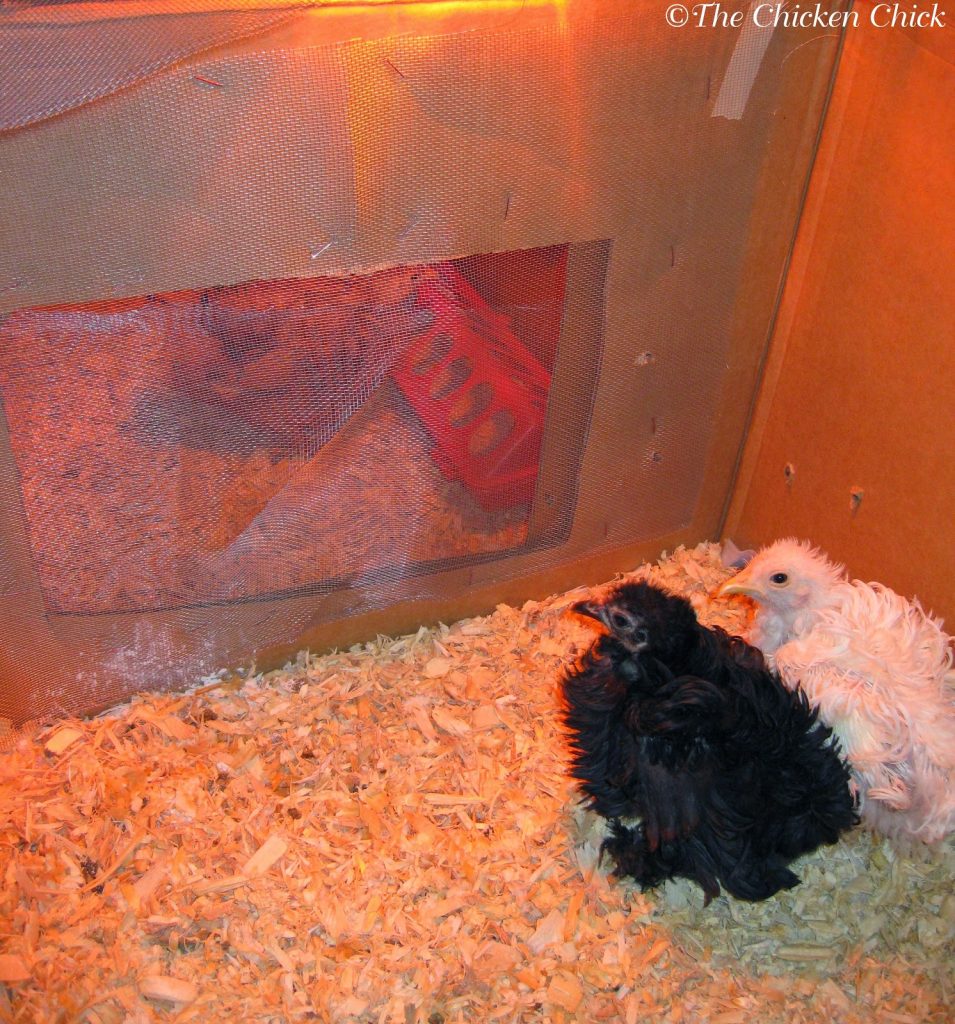
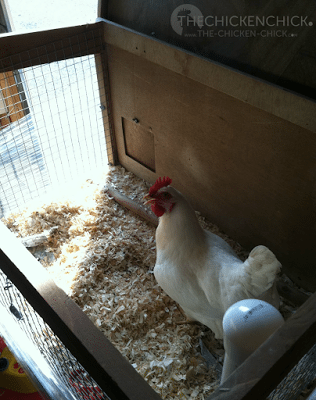
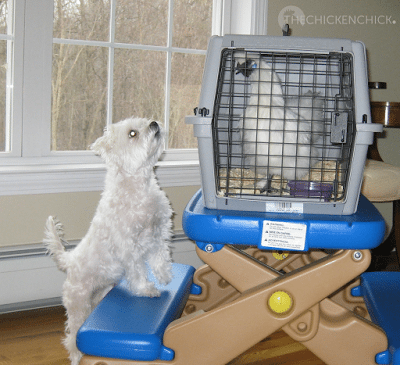
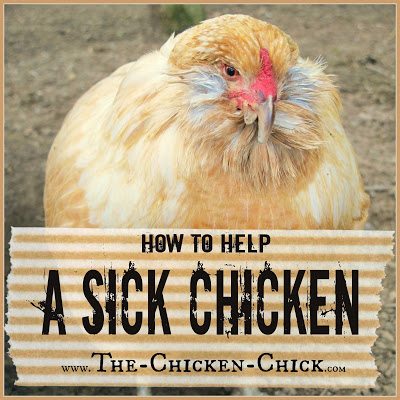

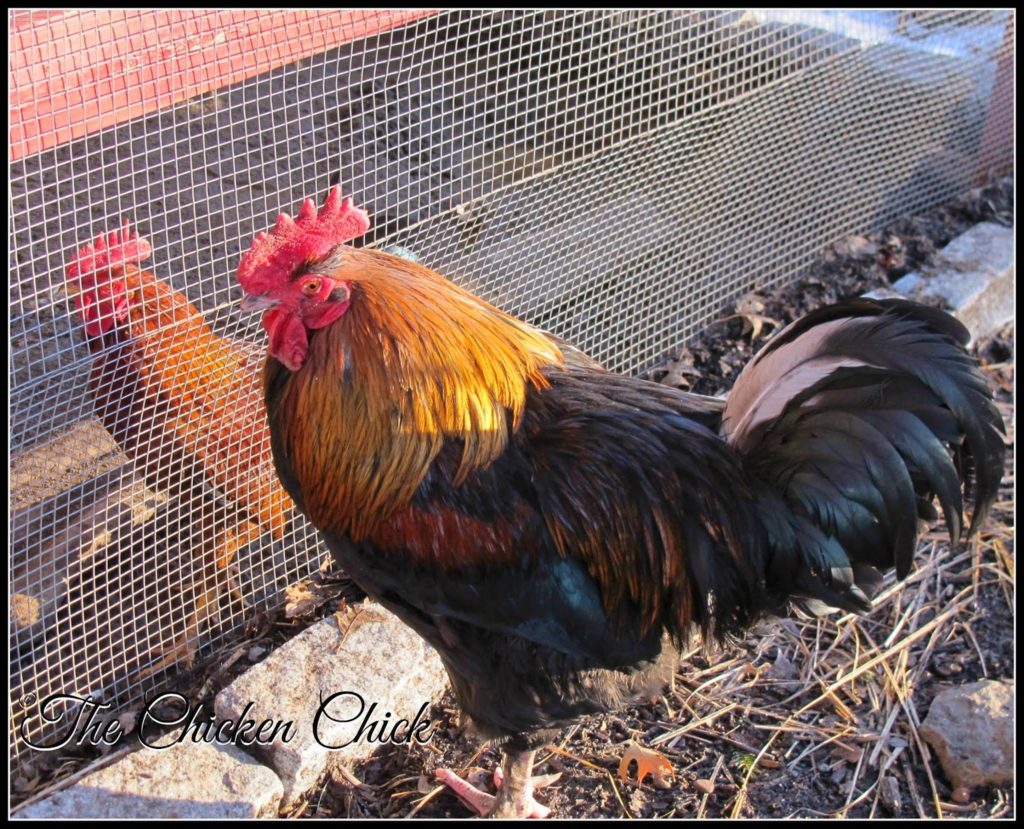






















Great info! New to chickens so love all the information that you have.
Never thought of having a 'sick area' for them. Thanks for the tip.
My pleasure, Christina! Enjoly your new flock!
this is such good information for a rookie like me! thanks for sharing!
Thanks Regina!
I agree everyone needs a first aid kit! You never know when you may need it!
Cheep Cheep Olejnik
Yup, they always keep us guessing, don't they Inanda?
I have read this blog many times in the last couple of months, I even bookmarked the page so it would be an easy find! Since reading this shortly after getting my chicks, I have been slowly picking up stuff that you listed for my first aid kit. I am working on plans for the inside of the coop (which should be finished by next weekend! *fingers crossed*) so that I can keep a "hospital room" near the other chickens for "moral support" (I think my girls will appreciate being able to chat with their friends even when they are… Read more »
Thanks so much for following along, Audrey. If you'd like to get the newest blog posts directly to your inbox, just become a follower via email, Google Friend Connect or Networked Blogs in the right-hand margin. ->
I can't wait to see your new coop on Facebook!!
Great article for a newbie like me ! I'd never really thought about a first aid kit for my chickens . But now that I've read this I will be putting one together :) Fallon
Thanks Fallon. Happy National Pet First Aid Awareness month! ☺